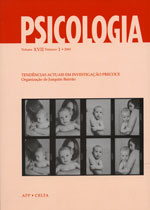An experiential approach in early intervention: In training, supervision and intervention
DOI:
https://doi.org/10.17575/rpsicol.v17i1.443Keywords:
-Abstract
Early Intervention (EI) is a family centered process, having as ultimate desired outcome, the development and well being of 0-6 children at risk of developmental delay (due to established, biological or environmental factors). Its success depends on the processes lived by their families, on their strive to become capable, empowered, in control of their own lives, raising their children, participating in the communities they live in, experiencing feelings of emotional well being and involvement. In order to support families in their strive to acquire all those strengths that make them families, the role played by professionals capable of being sensitive, stimulating and promoting autonomy of families is crucial. Scaffolding the professionals on their strive of acquiring competencies to develop the relational process underlying EI, we present a training, supervision and evaluating model of EI based on an experiential approach.


